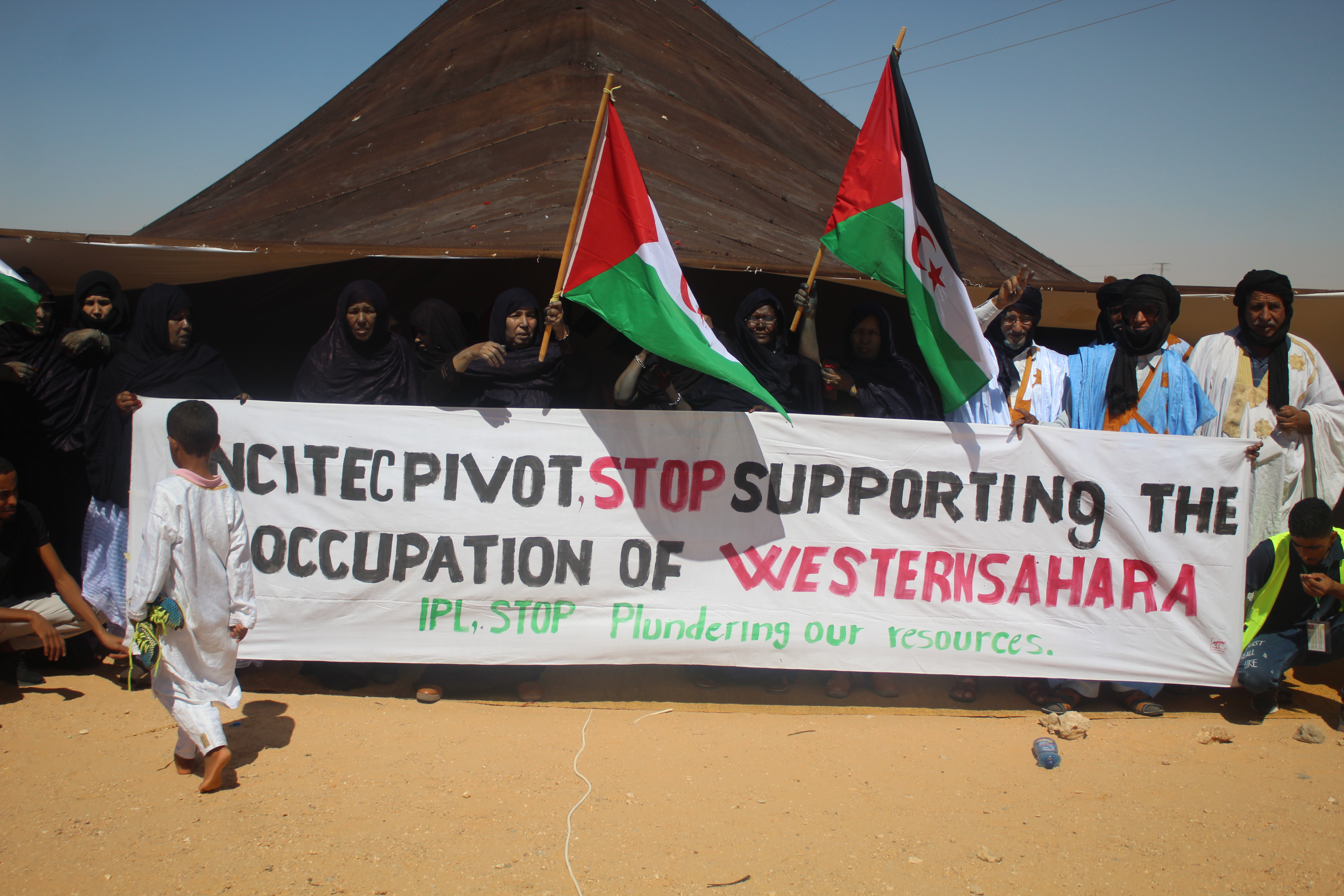
A group of Saharawi refugees yesterday demonstrated against the Australian company Incitec Pivot. The company has bought a cargo of conflict minerals from a mine on their land, from the occupation government.
The pictures in this article are taken by the group Saharawis Against the Plunder and can be used freely. The above picture can be downloaded here.
For the first time in 6 years, a cargo of conflict minerals is heading its way to Australia, espected to arrive on 18 October. A group of Saharawi refugees yesterday protested against the shipment. The demonstration took place in one of the Saharawi refugee camps in the middle of the Algerian desert where half the people of Western Sahara have sought refuge after Morocco brutally invaded their land.
Morocco's export takes place in violation of international law and Incitec Pivot is hence contributing to fund the illegal occupation.
Incitec Pivot is the only stock exchange registered company in the world that is involved in the trade. Some of the firm's investors are currently engaging with the company on the subject, WSRW understands.
WSRW first revealed the controversial cargo on 23 September. Four days later, IPL admitted its role in the purchase during a meeting with trade unionists in Australia.
WSRW wrote to the company on 20 September, but has still not received a response. The news service Africa Intelligence also did not obtain any clarification from the company.

The company was previously an important buyer of occupied Western Sahara's phosphate rock, and was under a lot of pressure from European investors until 2016, when the company seemingly halted the imports. However, the company did not make any promises excluding further imports in the future. For that reason, WSRW has in its annual reports on the phosphate trade never qualified Incitec Pivot in the same positive category as the other importers that have taken measures to prevent future imports.
The campaign group Saharawis Against the Plunder, that is behind the demonstration, is frustrated with Incitec Pivot's renewed purchases.
“We are disappointed and angry. Incitec Pivot has no right to buy the resources stolen by Morocco from our land. We hope the Australian people will stand up against this and defend justice and international law. Australian farmers should not contribute to occupation”, stated Zarga Abdallahi of the campaign group.
“Half our people have fled since Morocco occupied our land. As refugees, we condemn Incitec Pivot. This is a theft of our wealth. And as Saharawi young generations who were born in exile, its a theft of our future. We live in a time of history where international law should be supported, not undermined”, Abdallahi told.
“Morocco has no right to export our resources to other countries. We see the Australian people and government showing support to the people of Ukraine. But why does an Australian company do the opposite to our people? It is frustrating and makes us angry. Australian companies should not support the invasion of our land by buying from Morocco what is stolen from us”, Lehbib Abdullah of the group stated.
The vessel, Clipper Isadora's, scheduled arrival to Geelong port is now announced on the website of the port [or download].
The vessel sailed through the Suez canal. It is the first known shipment to Australia known to take that route, during the decade of WSRW's daily ship monitoring. Previously, Incitec Pivot shipments sailed around South Africa. That route has not been used after the cargo onboard the bulk vessel NM Cherry Blossom was arrested by South African authorities. The High Court in South Africa ruled that the cargo exported illegally by the Moroccan state-company OCP, and ruled the ownership of the cargo to be with the Saharawis.
The refugees who fled the occupation live in very harsh circumstances. On 24 August, three UN bodies called on the international community for increased humanitarian assistance to the Saharawi refugee camps in Algeria. The trio paint a critical picture of the situation with food rations cut by 75 percent and each beneficiary now only receiving less than a 5 kilos ration, compared to the planned 17kg per person per month. Each recipient now receives less than half of recommended daily intake of calories.


Since you're here....
WSRW’s work is being read and used more than ever. We work totally independently and to a large extent voluntarily. Our work takes time, dedication and diligence. But we do it because we believe it matters – and we hope you do too. We look for more monthly donors to support our work. If you'd like to contribute to our work – 3€, 5€, 8€ monthly… what you can spare – the future of WSRW would be much more secure. You can set up a monthly donation to WSRW quickly here.
Australia finally finished phosphate imports
The last remaining importer of phosphate rock from occupied Western Sahara in Australia has announced that it will no longer purchase the conflict mineral.
New report: Western Sahara phosphate trade halved
The export of phosphate rock from occupied Western Sahara has never been lower than in 2019. This is revealed in the new WSRW report P for Plunder, published today.
WSRW to Incitec Pivot - 03.12.2019
New report on Western Sahara phosphate industry out now
Morocco shipped 1.93 million tonnes of phosphate out of occupied Western Sahara in 2018, worth an estimated $164 million, new report shows. Here is all you need to know about the volume, values, vessels and clients.


